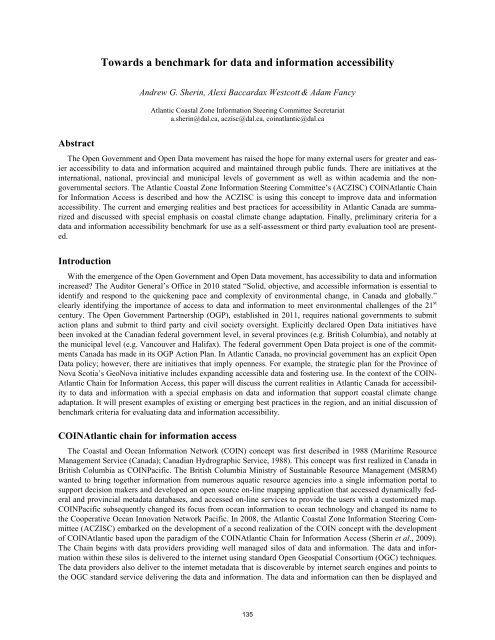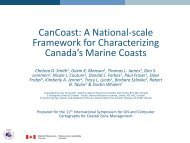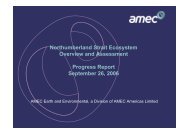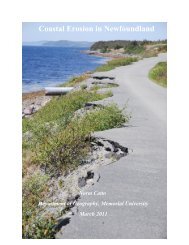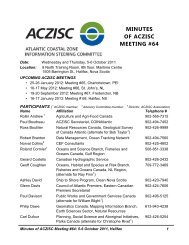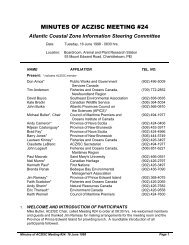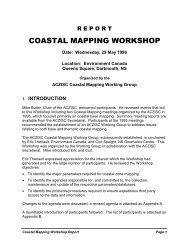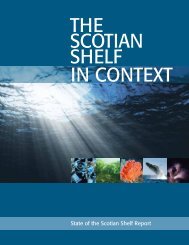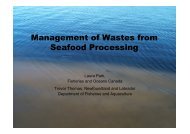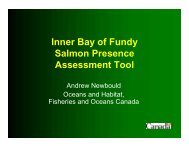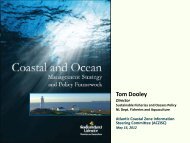Download PDF - COINAtlantic
Download PDF - COINAtlantic
Download PDF - COINAtlantic
- No tags were found...
You also want an ePaper? Increase the reach of your titles
YUMPU automatically turns print PDFs into web optimized ePapers that Google loves.
Towards a benchmark for data and information accessibilityAndrew G. Sherin, Alexi Baccardax Westcott & Adam FancyAtlantic Coastal Zone Information Steering Committee Secretariata.sherin@dal.ca, aczisc@dal.ca, coinatlantic@dal.caAbstractThe Open Government and Open Data movement has raised the hope for many external users for greater and easieraccessibility to data and information acquired and maintained through public funds. There are initiatives at theinternational, national, provincial and municipal levels of government as well as within academia and the nongovernmentalsectors. The Atlantic Coastal Zone Information Steering Committee’s (ACZISC) <strong>COINAtlantic</strong> Chainfor Information Access is described and how the ACZISC is using this concept to improve data and informationaccessibility. The current and emerging realities and best practices for accessibility in Atlantic Canada are summarizedand discussed with special emphasis on coastal climate change adaptation. Finally, preliminary criteria for adata and information accessibility benchmark for use as a self-assessment or third party evaluation tool are presented.IntroductionWith the emergence of the Open Government and Open Data movement, has accessibility to data and informationincreased? The Auditor General’s Office in 2010 stated “Solid, objective, and accessible information is essential toidentify and respond to the quickening pace and complexity of environmental change, in Canada and globally.”clearly identifying the importance of access to data and information to meet environmental challenges of the 21 stcentury. The Open Government Partnership (OGP), established in 2011, requires national governments to submitaction plans and submit to third party and civil society oversight. Explicitly declared Open Data initiatives havebeen invoked at the Canadian federal government level, in several provinces (e.g. British Columbia), and notably atthe municipal level (e.g. Vancouver and Halifax). The federal government Open Data project is one of the commitmentsCanada has made in its OGP Action Plan. In Atlantic Canada, no provincial government has an explicit OpenData policy; however, there are initiatives that imply openness. For example, the strategic plan for the Province ofNova Scotia’s GeoNova initiative includes expanding accessible data and fostering use. In the context of the COIN-Atlantic Chain for Information Access, this paper will discuss the current realities in Atlantic Canada for accessibilityto data and information with a special emphasis on data and information that support coastal climate changeadaptation. It will present examples of existing or emerging best practices in the region, and an initial discussion ofbenchmark criteria for evaluating data and information accessibility.<strong>COINAtlantic</strong> chain for information accessThe Coastal and Ocean Information Network (COIN) concept was first described in 1988 (Maritime ResourceManagement Service (Canada); Canadian Hydrographic Service, 1988). This concept was first realized in Canada inBritish Columbia as COINPacific. The British Columbia Ministry of Sustainable Resource Management (MSRM)wanted to bring together information from numerous aquatic resource agencies into a single information portal tosupport decision makers and developed an open source on-line mapping application that accessed dynamically federaland provincial metadata databases, and accessed on-line services to provide the users with a customized map.COINPacific subsequently changed its focus from ocean information to ocean technology and changed its name tothe Cooperative Ocean Innovation Network Pacific. In 2008, the Atlantic Coastal Zone Information Steering Committee(ACZISC) embarked on the development of a second realization of the COIN concept with the developmentof <strong>COINAtlantic</strong> based upon the paradigm of the <strong>COINAtlantic</strong> Chain for Information Access (Sherin et al., 2009).The Chain begins with data providers providing well managed silos of data and information. The data and informationwithin these silos is delivered to the internet using standard Open Geospatial Consortium (OGC) techniques.The data providers also deliver to the internet metadata that is discoverable by internet search engines and points tothe OGC standard service delivering the data and information. The data and information can then be displayed and135


